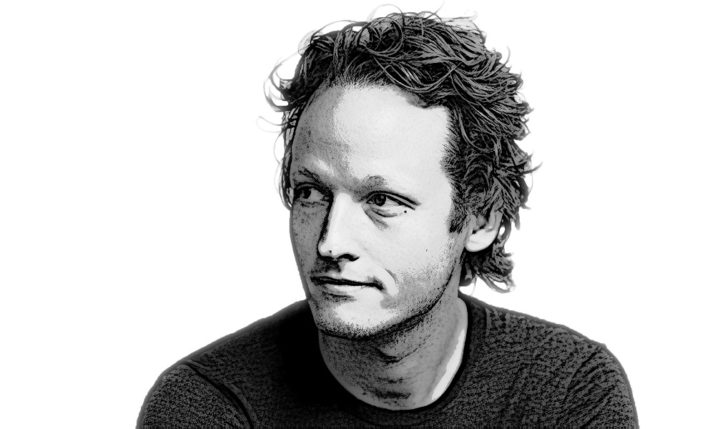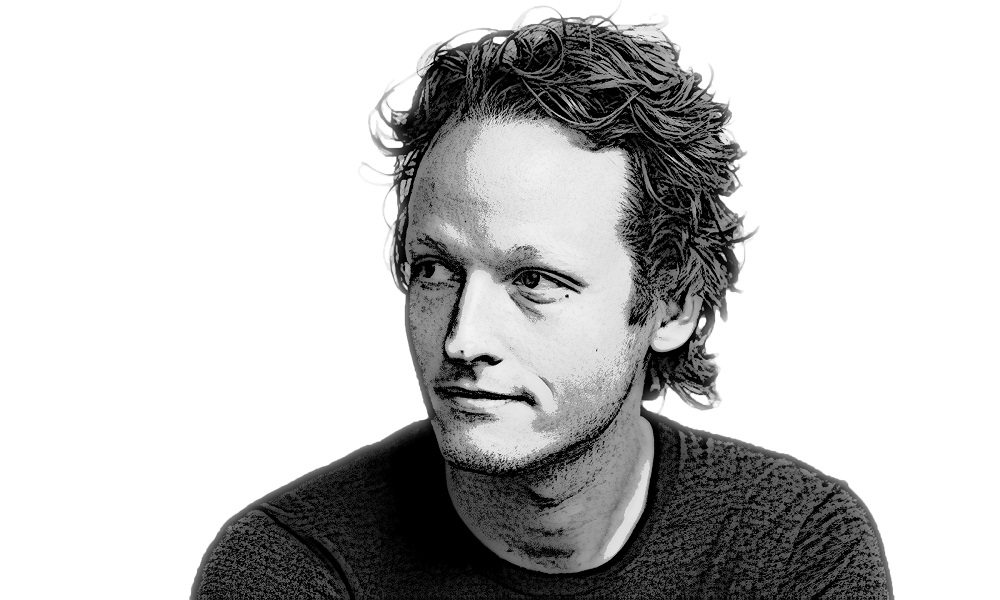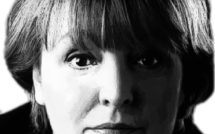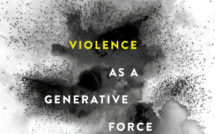

It was a cold and rain-soaked afternoon in New York, but Danish author Mikkel Rosengaard had of course still opted to ride his bicycle from his end of Brooklyn to mine. Nothing, I thought to myself, could be more Danish than pedaling stoically through rain and fog and traffic. As a writer, however, Rosengaard has always struck me as being somewhat un-Danish. His first novel, The Invention of Ana, originally published in Denmark in 2016 and now available in English from HarperCollins, is unlike anything in minimalist-dominated contemporary Danish letters. It is set in Brooklyn and Bucharest, it deals with concepts of time, art, and mathematics, and it even—gasp!—tells a story. And yet, as that story unfolds, The Invention of Ana grows to become a searching inquiry into the powers of narrative, the gift and the curse of storytelling, and the many layers of fiction we inhabit today.
Before sending Mikkel Rosengaard back out into the rain, I spoke to him about the power of narrative, Communist Romania, and the Brooklyn art world, among other things.
—Morten Høi Jensen for EuropeNow
EuropeNow Who is Ana Ivan? And what about her as a literary character made you think she ought to have an entire novel devoted to her?
Mikkel Rosengaard When I began writing this novel, I was very interested in finding a narrative so powerful it might change things in a physical sense — time, space, etc. Everyone has a story about how something changed their lives, but I was on the hunt for a story that changed things in a physical sense, or changed the perception of reality. At the time I was working at an arts biennale in Spain, where I met an artist who told me a very brief anecdote about two parents who raised their daughter in the belief that she is older than she actually is. I then built the novel around this anecdote, fleshing out Ana’s life and world.
EuropeNow You’ve written one book previously, a young adult novel. In what way did that inform your experience of writing The Invention of Ana?
Mikkel Rosengaard That’s right, I wrote a young adult novel, Videre, back in 2010 that was built entirely around the stories and anecdotes of the main characters, all of whom were high school boys—anecdotes they told about their nights out, experiences with sex and drugs, and so forth. It was a kind of mosaic of stories. I had always been interested in finding a way of capturing all the mini-fictions we live in on a daily basis, all the stories we inhabit, from Netflix to social media. But the book felt like a huge failure to me—I wasn’t able to build a solid novel only from stories and fictions recounted by those teenage boys. So, after writing Videre, I spent a few years reading a lot of contemporary fiction to see how other writers had done it, people like Knausgaard, Ben Lerner, and Rachel Cusk. But I kept stumbling on this notion that writing fiction has become impossible or obsolete, even ridiculous, sentiments that both Knausgaard and Cusk have expressed quite strongly. I found that I was disappointed by these ideas, that fiction was somehow obsolete. Because to my mind, we live in fiction to a far greater extent than ever before—from when we wake up we immerse ourselves in TV, social media, books, podcasts. We are constantly inhabiting fictions. This idea of returning to some kind of “authentic” literary mode seemed nostalgic, reactionary, totally outdated. These writers were celebrated as something new and exciting, but to me, these ideas felt like the literary equivalent of drinking from mason jars, or decorating restaurants with reclaimed wood. If we want the novel to be relevant in the 21st century, we have to stop being afraid of manipulative storytelling and start engaging with the layers of fiction we are all living in.
EuropeNow I found myself thinking of Nick Carraway, the narrator of The Great Gatsby, when I read The Invention of Ana. Because the person telling Ana’s story is this slightly naive young Dane who comes to Brooklyn to work in the art world, where he encounters this larger-than-life character, much like Carraway encounters Gatsby and begins inhabiting and questioning his semi-fictional world.
Mikkel Rosengaard There’s something liberating about a narrator who is slightly naïve, and who in some sense you can trust. The unreliable narrator has been explored at length, and we all know that every narrator is conditioned by gendered and socioeconomic influences and prejudices and so on. So to write a narrator who is almost childish, telling things just as he sees them, interests me. The voice of the enthusiastic follower, this kind of minion or yes-man who gleefully joins a stronger person’s fictional world, that voice seems very ripe for exploration. Especially when you look at our political landscape today. Of course, you might well question the narrator’s judgments about what he experiences, but I like the way his fascination or even obsession can be passed on to the reader. And then I also think there’s something very interesting about that youthful stage of one’s life, when you’re still like a lump of clay and can be formed and shaped by the people around you.
EuropeNow Did you always know you wanted to set the novel in New York?
Mikkel Rosengaard No, not at all. In the beginning, I set the whole novel in Romania. The first part I wrote was the part about Ana’s parents and their arrival in Bucharest. That was the core of the book. And then I began layering it with all these other ideas and stories. I always knew I’d be telling the story from a Scandinavian perspective, so to speak, because I don’t speak Romanian and I’m not an authority on Romania. So there had to be a kind of distance. But, given that I wanted to write about powerful and even manipulative narratives, I felt it wasn’t enough simply to tell one story; I realized it was important to create a narrator who is himself affected by the story he’s telling.
EuropeNow Is the novel’s juggling of ideas about time related to this?
Mikkel Rosengaard The notion of time was important because that’s the physical property that is manipulated in the novel. And, in fact, it’s what is always manipulated in a novel. Someone tells a story and that story alters and compresses time, to a greater or lesser extent. So I began reading a lot about time, or about our impression and understanding of time, and I probably got a little carried away by it, to be honest. I was carried away by how little we actually know or understand about time. I started reading about all these sensory deprivation experiments in the 1950s, about how quickly people began hallucinating when they were deprived of their senses. The researchers concluded that our brain is exceptionally good at interpreting all the millions of sensory impressions it absorbs throughout the day, and that when it is deprived of those impressions, it gets so confused that it just starts creating fictional impressions. What I found so interesting about these experiments was the idea that, in a sense, we’re always already living in a fictional world. Our brain is constantly interpreting, selecting, and discarding, doing all the narrative work for us.
EuropeNow You said you weren’t an authority on Romania, but you must have chosen that country for a reason?
Mikkel Rosengaard I studied political science and actually wrote my bachelor thesis on long-lived dictatorships. I compared Belarus and Equatorial Guinea—two countries that couldn’t be any more different. But both have dictators—Alexander Lukashenko in Belarus and Teodoro Obiang in Equatorial Guinea—that have been in power for decades, and I found that one of the reasons for their success was their ability to create these very powerful narratives about themselves. In democratic nations there is usually a multitude of narratives about people in power, but in these one-man dictatorships there’s just one, and its usually very warped and far-fetched. So I was very interested in the idea of Ceaușescu’s narrative in Romania, and of how one’s own narrative about one’s life clashes with that larger, overpowering official narrative. And then, of course, there’s the fact that, from a storytelling perspective, in a world in which these very rigid rules are imposed on you there’s much more at stake. In a liberal democracy everything can be renegotiated; if you lose your job, you can get another one. But in a dictatorship reality is less malleable because the official narrative is so rigid. In a somewhat lazy way, it makes it easier for the person telling the story.
EuropeNow Right. When Ana’s father doesn’t get the academic position he yearns for, his entire existence suddenly crumbles before him.
Mikkel Rosengaard Precisely. Whereas today, he could just move to another town or go to another university. There might be economic obstacles, but I don’t think they’re quite the same.
EuropeNow Tell us about the Brooklyn art world. It plays a part in the novel, and you yourself have worked in it and written quite extensively about it for a number of years.
Mikkel Rosengaard Since 2010, yeah. I’m happy to hear you say the Brooklyn art world and not the New York art world, because the characters in the novel don’t even make it to Manhattan. Of course the island is there in the distance, with its towers and skyscrapers, and here again I think there’s a point to be made about narratives, because Manhattan is one of the most powerful narratives in the world. When I’m home in Denmark I see Manhattan every day: in an advertisement or on TV or a poster somewhere. It’s crazy, I almost see Manhattan more in Denmark than I do in Brooklyn. Anyway, I wanted Manhattan to be a part of the novel, if only as this promised land that many of these young artists yearn to reach some day. It’s easier to be a young, experimental artist in Brooklyn, however, because the rent is usually cheaper and they don’t have to make as much money. There’s room for experimentation.
EuropeNow But what role does the Brooklyn art world play in the novel? Why does Ana present her time-travel experiment as a work of performance art?
Mikkel Rosengaard One of the things I love about writing about the art world is that things considered crazy elsewhere are thought to be entirely rational. In the art world there are plenty of reasons why an artist would want to lock herself in a dark room for a month. The artist might be laying the groundwork for a new series of work. The gallerist gets an audience who will want to experience it, maybe a collector will even want to purchase an aspect of that exhibition, and so on. No one bats an eye. From a writer’s perspective it’s a gift because these strange experiments and wild situations are the norm, so you avoid the trap of venturing into magical realism or fantasy. And I think the art world is always five or ten years ahead of the literary world, in terms of the ideas and forms experimented with. Of course, writing a work of fiction is a much more time-consuming and disciplined act, so it makes sense to me that it would lag behind a bit. The art world simply allows for a little more promiscuity and playfulness with ideas and experiments.
Mikkel Rosengaard is a writer in New York City. He is a two-time recipient of the Danish Arts Foundation’s Literary Fellowship and a regulator contributor to Weekendavisen, the Scandinavian weekly. His non-fiction has appeared in The Architectural Review, PBS’s ART21, Hyperallergic, and other publications. He grew up in Elsinore, Denmark, and now lives in Brooklyn. His first novel, The Invention of Ana is forthcoming from Custom House / HarperCollins in 2018.
Morten Høi Jensen was born in Copenhagen, Denmark in 1987. He attended The New School for Social Research in New York City and has contributed to numerous publications, including the Los Angeles Review of Books, Salon, and the New Republic. In September 2017, Yale University Press published his first book, A Difficult Death: The Life and Work of Jens Peter Jacobsen. He lives in Brooklyn, New York.
Published on February 1, 2018.




